If you’ve been planning to rank on search engines, then you already know that keywords are as important as SEO metrics. Every website you see that ranks on the first page of search engines have strategically used keywords to achieve their position.
Given the importance of this aspect in SEO, it just gives you more reason as to why you need to know more about keyword tracking. This process allows you to have insights into what you’ve been doing correctly on your SEO endeavors and what needs improvement.
In this article, you’ll get to learn more about keyword tracking and why it’s important for your business. You’ll also get to know how it’s done effectively so you can apply it to your own web pages as well.
What is a data dashboard?
When ranking on search engines like Google, you want to rank for keywords that relate to your business.
If you’re an SEO agency, you want to rank for keywords like “SEO agency”, “digital marketing group”, “digital marketers”, and “SEO marketing”. Basically, you want to rank for those keywords since those are the things that your company does.
So how do you know if your website is ranking for those keywords? You simply do keyword tracking.
Keyword tracking is the process of monitoring the position of your website or web pages for specific keywords. Doing this process allows you to see if your website is ranking for keywords that you’re targeting in your content.
The results you see here will give you an overview of your website’s SEO performance. You’ll see what keywords you are doing well on and what keywords you need to improve your visibility.
What is keyword tracking?
When ranking on search engines like Google, you want to rank for keywords that relate to your business.
If you’re an SEO agency, you want to rank for keywords like “SEO agency”, “digital marketing group”, “digital marketers”, and “SEO marketing”. Basically, you want to rank for those keywords since those are the things that your company does.
So how do you know if your website is ranking for those keywords? You simply do keyword tracking.
Keyword tracking is the process of monitoring the position of your website or web pages for specific keywords. Doing this process allows you to see if your website is ranking for keywords that you’re targeting in your content.
The results you see here will give you an overview of your website’s SEO performance. You’ll see what keywords you are doing well on and what keywords you need to improve your visibility.
How to do keyword tracking?
1. Traditional keyword tracking
This method is considered a classic when it comes to keyword tracking. A website owner can manually check for a keyword and see if their web page ranks on search engines.
The challenge with this is that the person needs to account for various things when doing research on search engines. Most of these search engines factor in different elements within a search result – especially with Google.
Sometimes, Google tends to give out different results to each user because of its personalization feature. Google considers the user’s device, locality, language, and browsing history.
2. Local rank tracking
Businesses should check if the keywords they’re ranking for have local search intent. If it does, then ranking on the first page would be a lot harder.
Keywords with local intent have different rankings based on area code, city, to even the neighborhood.
So how do you know if your keywords have local intent? Try searching it on Google. If it triggers a Local Search Pack, then Google thinks that the keyword has local intent.
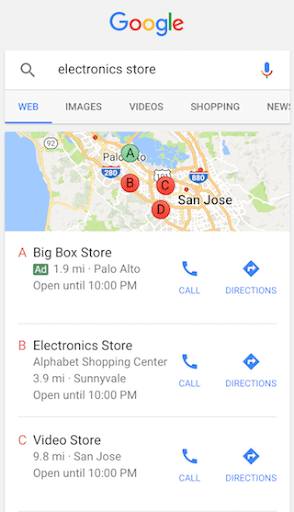
Local Search Pack is Google’s search results that display the local businesses related to your query.
So if your business only operates online and you are targeting keywords with local intent, it’s better to look for another set of keywords.
If you persist in using the same keywords, it will always be difficult for you to rank. Since Google’s algorithm sees that your targeted keyword has local intent, it is programmed to display companies that have their own address and physical store.
But if you’re a local business and you intend to rank on these keywords, here are a few tips you can do:
Set up your Google My Business Page – Once you’ve claimed your business page, make sure it includes a long and unique description and the category of your business. You can also upload photos, add a phone number, a business address, operating hours, and reviews from customers.
Be consistent with your NAP – NAP stands for name, address, and phone number. If possible, make sure it is easily seen on your website. If you’ve noticed, websites that rank on local searches display those details.
Utilize those reviews – According to Google, more reviews and positive ratings can improve your business’s local rankings.
You can place all of this information on the bottom part of your website. Checkout how Mixam’s website has all of these elements present:

3. Using keyword tracking tools
The best and most efficient way to do keyword tracking would be to use tools that have this feature. This makes the overall process a lot easier and brings more in-depth analytics and results.
These tools make analytics engaging with their charts and line graphs. It makes any data analysis process easier. Plus, if you’re an agency, you can collate all important metrics and create an engaging presentation for your clients.
Since we can’t discuss all of the tools available for public use, let’s talk about the top 3 most recommended ones.
a. Ahrefs
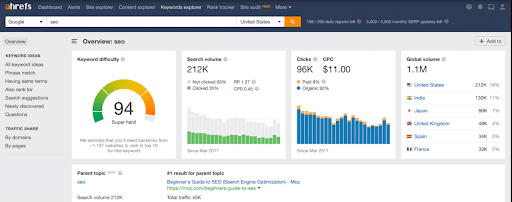
Ahrefs is a well-known tool for backlinks and SEO analysis. The website is always part of every recommendation post from different websites.
It’s basically an all-in-one place where you can do keyword research, site analysis, and other SEO activities. This makes it a great tool to be partnered with Saas marketing campaigns, B2B marketing, social media marketing, and many more.
With the number of things that you can do on this platform, it makes sense why Ahrefs is the go-to website for everything SEO-related.
b. SEMrush

If you’ve searched for SEO tools or even just content-related tools, you’ve definitely run into SEMrush already.
SEMrush is one of those household names when it comes to social media, SEO, PPC, and content solutions. It’s just so widely used that the majority of its reviews come from agencies.
With its easy-to-use interface and the number of features within its platform, SEMrush is a great tool for keyword tracking and SEO campaigns.
c. Google Search Console
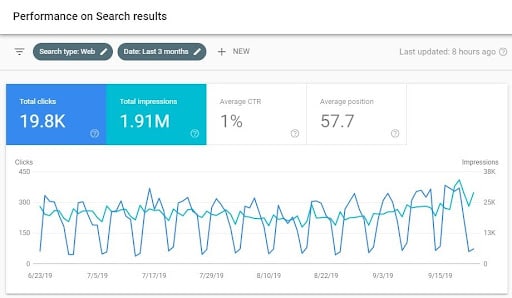
People use Google Search Console because of its high accuracy. Some would choose this over other tools because the search engine always accounts for differences in search caused by personalized search results.
d. Cyfe’s Web Analytics dashboard
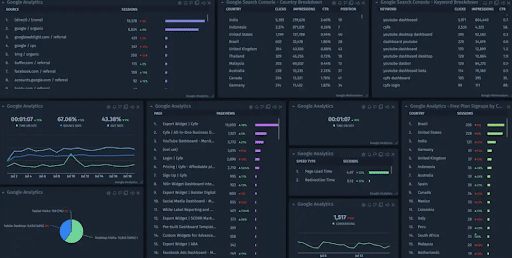
Using Cyfe’s web analytics dashboard, you get to track the performance of your website. It can be an all-in-one place to check the important metrics and necessary data to improve the current state of your site.
In terms of keyword tracking, the dashboard provides a clear picture of keywords that drive new visitors from Google. It also monitors all of your traffic channels and top organic keywords.
All of the features that the web analytics dashboard presents can help any website owner in creating content strategies and other improvement opportunities.
Benefits of keyword tracking
Keyword tracking shows whether your SEO strategies and efforts are paying off. The process provides you important insights on how your website is ranking in search engines relative to specific keywords.
It gives you an overview of your website’s search engine presence. If you don’t see any improvements in your website’s ranking, it can mean that your SEO strategy needs to change.
By giving attention to keyword tracking, you’ll have an idea of how your web pages are performing. It also gives you insights on what keywords you need to work on more.
Some would even hold online conferences or summits just to discuss these things. But the fact that you know about keyword tracking now puts you at a serious advantage.
The advantage of this is you get to see issues at an earlier time. You get to work on your mistakes and improve your process before things get worse.
This puts you ahead of companies that mindlessly produce content and hoping to rank on search engines.
To further dive into the topic, here are other important benefits that keyword tracking solves for you:
1. Boosts your revenue
If you’ve been tracking the analytics of your website, then you know which pages have the most visits and clicks. But unfortunately, visits and clicks can only do so much for a business. To keep the overall operations running, it needs to make money.
To take keyword tracking a step further, you can utilize those high-ranking web pages to sell your products or services. You can also use them to naturally introduce your referral program or insert your affiliate links.
When more people get to see your products, services, and links, the higher the chance that those things will convert.
2. You can double down on what works for your website
A problem with some of the websites in competitive industries is that they think there are only a few sets of ways on how they can rank on Google. They think that the information shared online is the only path to rank high on search engines.
What they don’t realize is their business can have its own sets of ways on how it can rank – they just need to observe what’s working for them. And a way to do so would be keyword tracking.
Since keyword tracking is a process to see where you rank on certain keywords, you get to see your web pages that have high visibility. These pages are proof that your SEO efforts were correct.
Knowing what works for your audience, means you can now double down on the strategies you used on those top pages. You can duplicate those results or better yet have more improved metrics than your current top web pages.
3. Find solutions to traffic dips
Unless you’re making a killing on your SEO game, traffic drops are a common thing for websites. You just can’t expect to be at the top for a long time especially if you’re ranking for highly competitive keywords.
A few reasons for this can be a need for re-optimization of those pages or a change in the search engine algorithm that you weren’t aware of. Sometimes it can also be a website or a domain issue. That’s why companies go to the lengths to hire a web developer to check and fix this certain issues.
By doing keyword tracking, you get to address these problems earlier. You get to find solutions for these issues before they get worse.
4. It helps you monitor your competitors
Keyword tracking also lets you know which keywords are your competitors ranking for and what they’re missing out on.
This works well in new industries. Some keywords won’t be too crowded like ones in the NFT-DeFi space and the emergence of the streaming industry. Being a first-mover gives you an opportunity to effectively create an SEO keyword strategy.
It gives you an option to go for keywords that have less competition. There are many ways to tackle this aspect, just make sure that the process you’re going for benefits your efforts.
If you see that your competitors are gaining traction with some keywords, you can also look into why that’s the case. Could it be that they’re publishing more content? Are they taking a different route in their content production? Do they have a new marketing campaign?
The process of looking at your competitors gives you a set of new ideas on how you can improve your own content and strategies.
5. Find new opportunities for your site
By analyzing what works for you and your competitors, you get to find new opportunities to jump on. These keywords that you’re targeting will surely branch out to other keywords as well.
For example, if you’re primarily targeting “sales tools”, you can dive deeper into the term and unlock a whole set of possible keywords. The term will give you keywords like predictive dialers, CRM systems, paid and free project management softwares, and automated tools.
This also works outside the realm of all things digital marketing. Keywords along the lines of personal development, skincare, health and wellness, these too can introduce you to related terms that you can target.
Basically, any keyword that you’re targeting right now can lead you to find new opportunities.
By using keyword tracking and looking at keywords that work for your website, you’ll also get insights on a whole new list of keywords that you can target.
3 tips to improve keyword rankings in Google
Now that you know what keyword tracking is, how it’s done, and the different benefits of doing it, it’s time we talk about how you can greatly improve your keyword rankings.
Since the essence of keyword tracking is to look at where your website stands when it comes to certain keywords, let’s discuss how you can improve your website and web pages in search engines.
I. Optimize your content
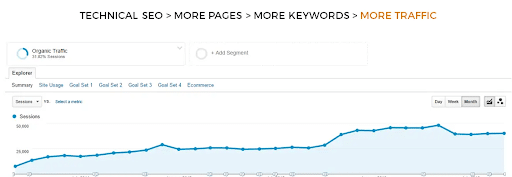
Optimization is vital to business growth. Keyword tracking and making keyword-focused content leads to the optimization of your website which is considered a growth hacking strategy by many.
If you’ve been slacking and wondering why you haven’t been hitting your content marketing KPIs, you can review these elements of your content:
Title Tags – Your title tag should tell you what your content is. Make sure it’s unique and up to 60 characters only. If possible, include the keyword you’re targeting in the title.
Meta Descriptions – Most websites tend to leave this section blank. Meta descriptions are phrases pertaining to what your content is about. It’s like a sneak peek of the whole content. When writing this, make sure it’s concise and you’re able to hook your readers.
Header Tags – Headers are used to make the overall article structure be more organized. Don’t just increase the font, use your H1’s or H2’s properly. Search engines also consider these header tags when it comes to ranking a website.
URL Structure – The URL for your content should contain the keyword you’re targeting. Sometimes, businesses make their targeted keyword their domain name which also works.
An example of this would be www.restaurant-website-builder.com. When you search for the keyword “restaurant website builder” in search engines, it naturally comes at the very first page.
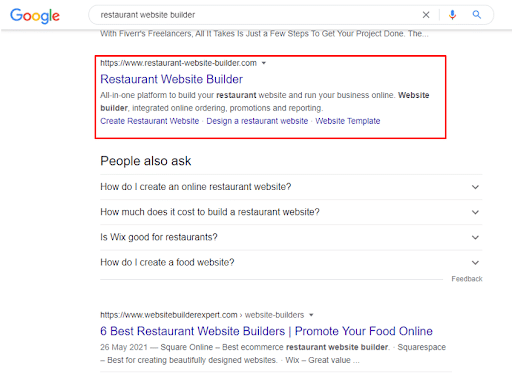
Images – Pictures make the overall article lively. If readers see a wall of texts, it automatically turns them off.
Keywords – If you want to rank for a certain keyword, make sure you use it naturally in your content. The number of times a keyword should be present will depend.
Overall Content – Your overall content should bring value to readers. If it benefits readers wherein they get lessons and ideas after reading, naturally they’ll share it with others.
If a lot of people get to read your content and share it to multiple platforms, this tells Google that your content is valuable and is worth ranking.
An example of optimized content would be a blog by Aura as shown below. Aura’s web pages ranked on the first page of Google when you search for the keyword “amazon repricer”.
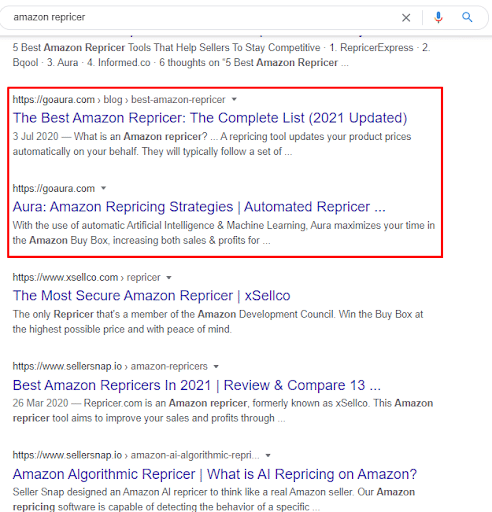
The first web page that ranked is a blog post of theirs talking about the keyword “amazon repricer”. Notice how they didn’t only use the keyword on the title, but it’s also present in the URL and meta description.
The second web page was Aura’s website. The brand has been producing content around that keyword that Google saw Aura as an authority website when it comes to that topic.
II. Avoid keyword stuffing at all costs
Keyword stuffing is when a website stuffs keywords in a web page even if it’s out of context. They do this with the hope of ranking high for that keyword in search engines.
Although this doesn’t work for Google since its algorithm can detect such acts, you still shouldn’t consider this for the sake of visibility.
Make sure when you’re using the keyword you’re targeting, place them where it makes sense. Use them in context and not for the sake of stuffing them in your article or home page.
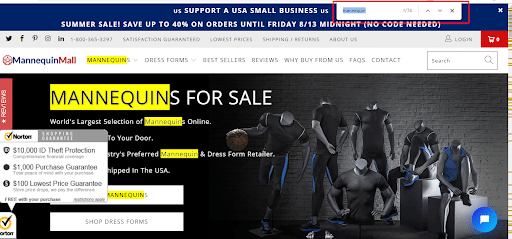
In the example above, look at how many times the word “Mannequin” was used on MannequinMall’s homepage. The term was used 74 times on a single web page.
But was this considered keyword stuffing? No. Because if you check and read the whole page, every term was used naturally and was in context every time.
Even Google thinks that this isn’t keyword stuffing. In fact, due to their overall content and strategic use of the keywords, when you search in Google “mannequin online” or “mannequins for sale”, MannequinMall will always pop up on the first page.
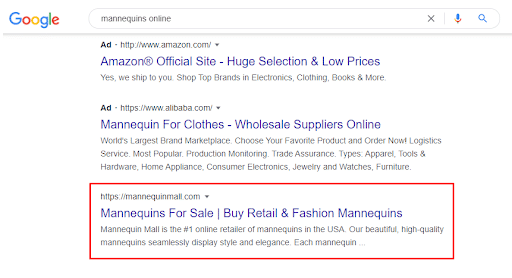
III. Be specific, concise, and clear
When you’re creating content, it’s easy to be too focused on ranking on Google. You tend to only focus on what Google looks for in an article. This makes you forget one important aspect in this whole equation – your audience.
No matter who your audience is, people appreciate when the information they’re looking for is provided to them immediately. They appreciate when the content gives them the answer they need without delay.
An example of this would be VPNOverview’s “Watching Netflix with a VPN – A Step-by-Step Guide”.
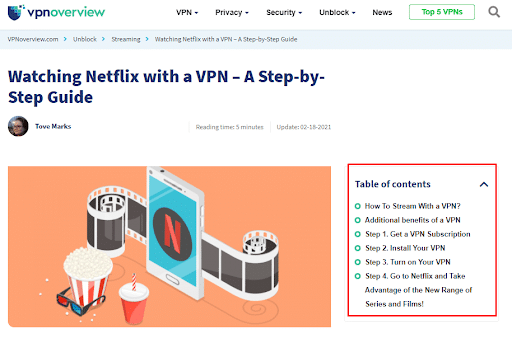
This blog is a great example because the content goes straight into the details immediately. It only suggested one VPN provider and moved on directly to how the readers can navigate it.
The article was straight to the point and was concise on the information it wanted to relay. This is why this blog ranks high on the search for “Netflix VPN guide” – a keyword that they were targeting.
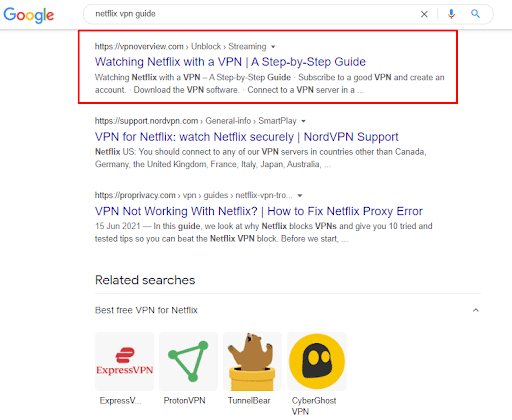
Conclusion
Business owners like keyword tracking because it gives them an idea of how well their websites perform for certain keywords. The process shows whether their SEO strategies are working or it needs further improvement.
Other than knowing how a website is performing, keyword tracking also allows you to see what the competition is doing. This gives business owners ideas if they ever rework their digital strategy.



